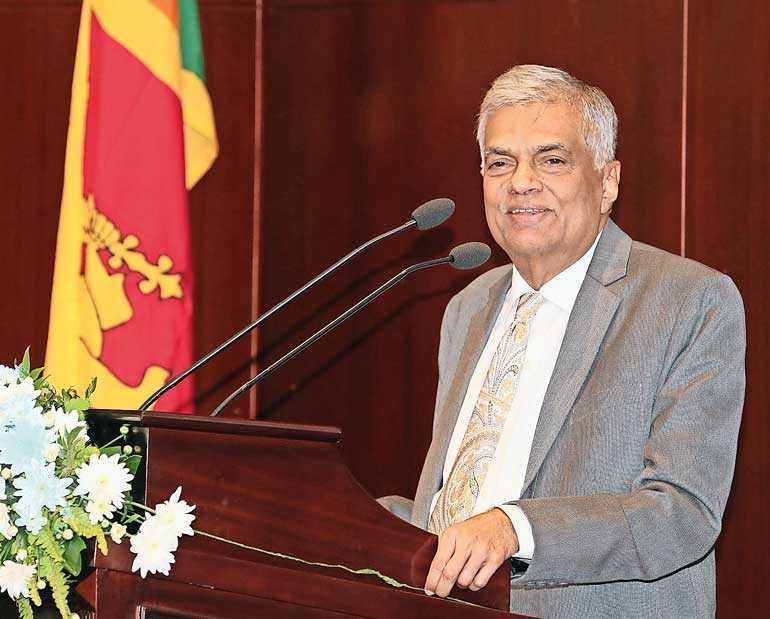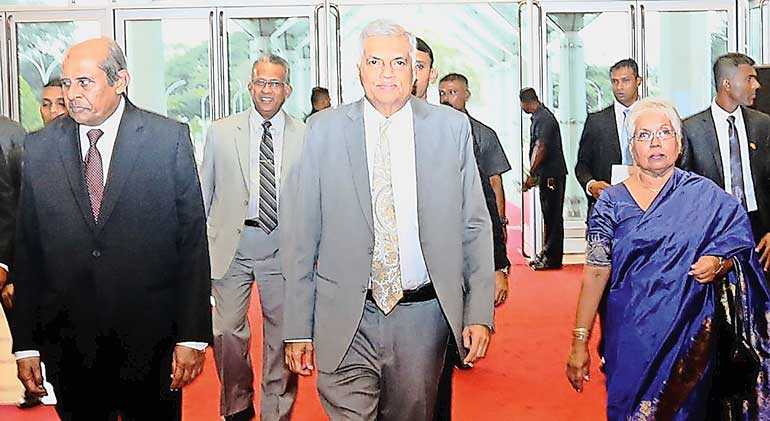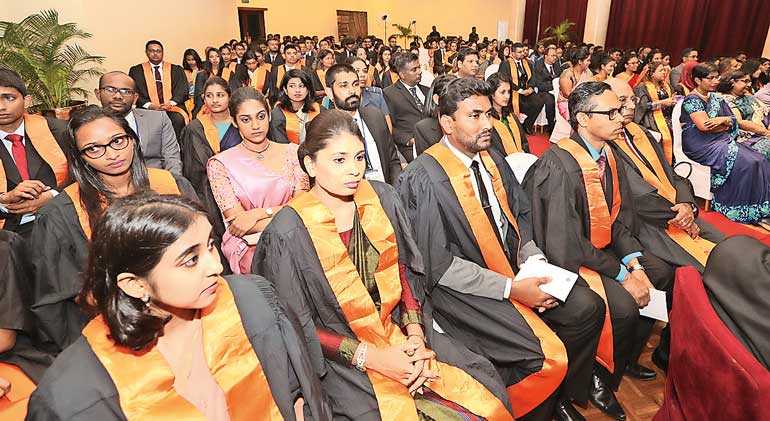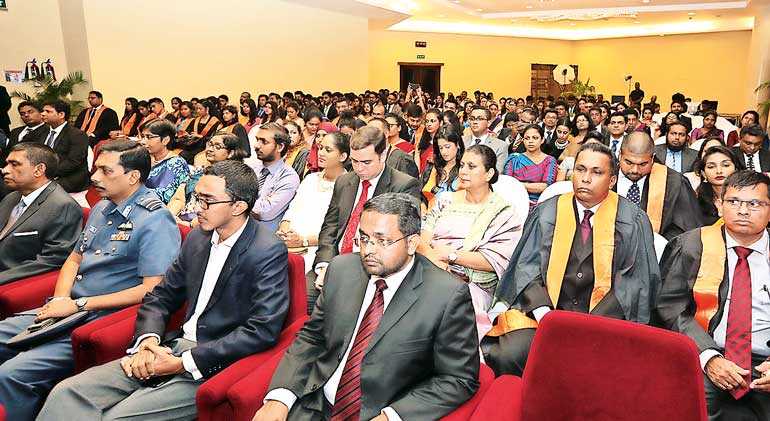Sunday Feb 22, 2026
Sunday Feb 22, 2026
Thursday, 19 July 2018 00:00 - - {{hitsCtrl.values.hits}}

As the political interplay in the Indian Ocean intensifies, Sri Lanka has an important role to play in providing the space for discussions and consensus building, Prime Minister Ranil Wickremesinghe said, speaking at the Bandaranaike International Diplomatic Training Institute Convocation last week.
Noting that a power struggle among some of the big countries would adversely affect Sri Lanka’s objective of becoming the hub of the Indian Ocean, which can jeopardise country’s future development, Wickremesinghe said that it will also push littoral states into spectators in the Indian Ocean. 
“Since a stable maritime order is a prerequisite for Sri Lanka’s development, we have an opportunity to leverage our strategic location and our friendly relations with the key maritime nations to take the initiative to lessen tension in the Indian Ocean region. Keeping the sea lanes of communication open by ensuring freedom of navigation in the Indian Ocean is a strategy to achieve this objective. Our good relations with all stakeholders make us most suitable to take initiatives to talk on the freedom of navigation in the Indian Ocean,” he said.
Stressing on the role the country has to play, the Prime Minister said that regional initiatives such as the Belt and Road Initiative, Indo-Pacific Strategy, Act East, Neighbourhood First, and Free and Open Pacific and Indian Ocean, can provide space for further integration of regional economies.
“Sri Lanka participated in China’s Belt and Road initiative since it complements Sri Lanka’s own initiatives. The Maritime Silk Road further strengthens our role as the Hub of the Indian Ocean,” he said, explaining the importance of the initiative to the country.
Further, he said Japan’s Two Ocean Initiative strengthens emphasis on peace and stability in the two oceans and the concept of freedom of navigation in the Indian Ocean. Its emphasis on economic prosperity helps in improving connectivity.
“India’s Act East and Neighbourhood First policies also complement our initiatives and, in particular, the concept of Sri Lanka as a hub,” he said.
Following are excerpts from the Prime Minister’s speech:
Four centuries of Western domination in the Indian Ocean has come to an end. Asian nations are re-emerging as Economic and military powers. This has brought a new focus on Asia and the long neglected Indian Ocean region. It also gives Sri Lanka’s foreign policy a new impetus to play a significant role in the region.
The foreign policy of newly-independent Sri Lanka under Prime Minister D.S. Senanayake focussed on Asia, spported the independence struggle in Indonesia, recognised the People’s Republic of China and called for a formal peace treaty with Japan. Sri Lanka and Australia proposed the Colombo Plan at the Commonwealth Foreign Affairs Conference held in Colombo in 1950 and entered into the Rubber-Rice Pact with China in 1952
Thereafter Sir John Kotalawela took the initiative to summon India, Myanmar, Pakistan and Indonesia the other Asian powers to meet in Colombo, in April 1954. The phrase non-alignment was used for the first time at this meeting. The Asian powers in turn summoned the 1955 Afro-Asian Conference in Bandung which was also attended by China and Japan. The next step was a large gathering which included non-Afro Asian nations.
In 1956 Nehru, Nasser and Tito signed a declaration in Yugoslavia calling for a Non-Aligned Movement. Prime Minister Sirimavo Bandaranaike of Sri Lanka, one of the initial conveners of the first meeting of the Non-Aligned Movement, played an important role during her tenure in office including holding the 1976 Summit in Colombo. Sri Lanka’s foreign policy adjusted its focus accordingly. It was necessary during the height of the Cold War period.
The Colombo Summit was also during the peak of the NAM. However, subsequent Soviet-American detente NAM declined in importance. Thereafter, the Movement was left to re-define its relevance after the collapse of the Soviet Union brought the cold war to an end. This collapse followed by the global financial crisis of 2012, has seen the major transformation of the global order.
Following the end of the conflict in Sri Lanka, and related human rights issues that arose, Sri Lanka since January 2015, has introduced a new multi-pronged approach to re-position itself in the regional order.
New developments in the region and beyond have re-established the strategic importance of the Indian Ocean. The rapid growth of the East Asian, ASEAN and the Indian economies all dependent on international trade has resulted in the Indian Ocean becoming the lifeline of Asian economies.

The oil and gas from the Persian Gulf have to pass through this largely-enclosed water body controlled by choke points. As a result the Indian Ocean sea-lanes of communication, one of the busiest in the world, is vital for the smooth functioning of the emerging geo-energy era. The most important Sea Lines of Communication (SLOC) run past Sri Lanka, making it a strategic location for the control and safety of the sea lanes and communication lines. It gives Sri Lanka the opportunity of becoming the hub of the Indian Ocean as well.
The control of the strategic foothold of the SLOC and the choke points in the Indian Ocean enables the control of the energy. This has resulted in a number of geopolitical issues coming to the fore: China recognising its strategic vulnerability in the Indian Ocean and has sought to reduce its vulnerability. As a result of China’s challenge to the US in the Pacific, the US is obviously concerned about a possible Chinese expansion in the Indian Ocean. India, the strongest power among the Indian Ocean littoral states as well as several other states, is concerned about a possible change in the status quo. Japan, Australia and several other countries in the region and beyond are committed to a free maritime order in the Indian Ocean.

This political interplay in the Indian Ocean is in danger of becoming a major centre of tension. A power struggle in the Indian Ocean will no doubt also adversely affect Sri Lanka’s objective of becoming the hub of the Indian Ocean. Sri Lanka’s future prosperity depends on the stability of the Indian Ocean. A power struggle in the Indian Ocean also risks making the littoral states into spectators in the Indian Ocean.
The Indo-Pacific Strategy is a concept recently articulated by the USA. China appears concerned that this strategy could contain China in the Pacific and Indian Oceans and thereby increase its strategic vulnerability. Speaking at the Shangri-La Summit in Singapore, Prime Minister Modi reassured: “India does not see the Indo-Pacific Region as a strategy or as a club of limited members. Nor as a grouping that seeks to dominate. And by no means do we consider it as directed against any country.” Let this be the starting point.
Since a stable maritime order is a pre-requisite for Sri Lanka’s development, we have an opportunity to leverage our strategic location and our friendly relations with the key maritime nations to take the initiative to lessen tension in the Indian Ocean region. Keeping the sea lanes of communication open by ensuring freedom of navigation in the Indian Ocean is a strategy to achieve this objective. Our good relations with all stakeholders make us most suitable to take initiatives to talk on the freedom of navigation in the Indian Ocean.

Sri Lanka accepts the concept of a free and open Indo-Pacific. The term Indo-Pacific is of recent origin. The issues of the Indian Ocean are not the same as that of Pacific. We in the Indian Ocean must seek to contain tensions while maintaining present tranquillity.
The freedom of navigation in the Indian Ocean must be based on the UN Convention on the Law of the Sea (UNCLOS). There is no need for a new code of conduct. The immediate objective is to arrive at a consensus among all stakeholders, which includes the littoral states, on the manner of upholding UNCLOS in the Indian Ocean. We need to identify specific issues of concern and clarify the relevant provisions with a view to strengthening cooperation to ensure open sea-lanes.
There will also have to be a consensus on new areas that needs cooperative action such as terrorism, human smuggling and piracy, which are not fully covered by UNCLOS. We must seek to accommodate the interest of all parties within the agreed principles. This initiative can be taken together with the Indian Ocean Region Association (IORA) and become complementary to initiatives to promote maritime economy, environment and Indian Ocean Region blue economy.

Sri Lanka has an important role to play in providing the space for discussions and consensus building on the freedom of navigation in the Indian Ocean and related issues such as maritime economy and environment. All stakeholders must participate in such an initiative.
Regional initiatives such as the Belt and Road Initiative, Indo-Pacific Strategy, Act East, Neighbourhood First, Free and Open Pacific and Indian Ocean, can all be treated as complementary. They can provide space for further integration of regional economies as well.
Sri Lanka participates in China’s Belt and Road initiative since it complements Sri Lanka’s own initiatives. The Maritime Silk Road further strengthens our role as the hub of the Indian Ocean.
Japan’s Two Ocean Initiative strengthens emphasis on peace and stability in the two oceans and the concept of freedom of navigation in the Indian Ocean. Its emphasis on economic prosperity helps in improving connectivity.
India’s Act East and Neighbourhood first policy also complements our initiatives and in particular, the Sri Lanka as a hub concept.